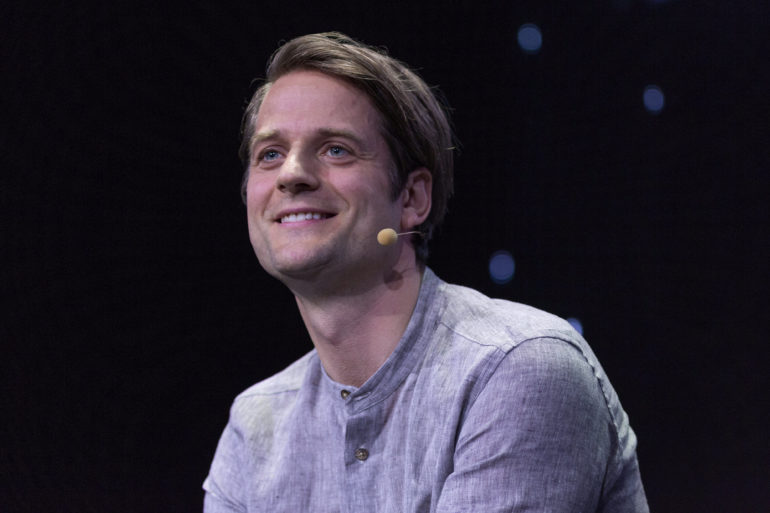LONDON — A growing number of renowned U.S. tech investors are moving to Europe to capitalize on the continent’s start-ups.
It comes after several European tech companies saw their valuations sky-rocket during the coronavirus pandemic. Online events platform Hopin saw its valuation soar to $7.75 billion within two years of its incorporation, while buy-now-pay-later firm Klarna was most recently valued at $46 billion.
U.S. venture firms are flying staff out to Europe and hiring people already on the ground in the region as they look to find the next Spotify or the next ASML, a Dutch semiconductor firm whose market value has grown to $331 billion amid the global chip crunch.
Veteran investor Alex Ferrara, a partner at Bessemer Venture Partners, which has backed companies like LinkedIn and Pinterest, moved from New York to London in September, according to a venture capitalist familiar with the matter who asked to remain anonymous due to the sensitive nature of the discussion. Ferarra did not immediately respond to a CNBC request for comment.
Also last month, Silicon Valley venture firm Lightspeed Ventures, which has invested in Snap and Epic Games, hired Paul Murphy and Ross Mason to lead the company’s push into Europe.
London-based Murphy was one of the first investors in London-based Hopin, while Geneva-based Mason was the co-founder of MuleSoft, which was acquired by Salesforce in March 2018 for $6.5 billion.
In London, Lightspeed has also hired Adrian Radu, a former associate at investment bank Qatalyst Partners, according to LinkedIn. The trio join Lightspeed partner Rytis Vitkauskas, who has been based in London since Sept. 2019.
Elsewhere, General Catalyst, an investor in Airbnb and Stripe, hired London-based Chris Bischoff as a managing director in May and Juliet Bailin as a principal in June, according to LinkedIn.
Still no tech behemoth
While Europe still lacks a tech behemoth like Apple or Amazon, it is home to an increasing number of tech companies worth tens and even hundreds of billions of dollars and some believe it’s only a matter of time before Europe creates a tech firm on the same scale as the behemoths in the U.S. and Asia.
“The consensus has morphed from believing Europe is a doomed tech backwater, to Europe has emerged as a real global player with multiple category owning companies,” London-based investor Hussein Kanji told CNBC, pointing to Spotify, Klarna, Revolut and Darktrace.
“Everyone who matters is opening up shop in London (surprisingly the big European winner despite not being in the European Union anymore) or looking at European deals,” said Kanji, who is a partner at Hoxton Ventures.
“It’s great for the ecosystem because 3/4 of the winning companies in Europe raise from U.S. funds anyway,” he added. “It just makes you think if European tech will be dominated by risk-seeking Americans, much the same way global investment banking and the City of London is dominated largely by U.S. firms.”
Sequoia, perhaps the best-known venture capital firm in the world, announced a move to London last year, with veteran partner Matt Miller moving from San Francisco to the U.K. capital.
The investment firm, which backed Apple and Google in their early days, now has an office in Marylebone with four partners and one talent director based there.
Sequoia has backed more than 10 companies in Europe since opening the London office. However, Sequoia’s total investments on the continent are substantially higher as it has been investing in Europe for over a decade, backing the likes of Bristol-based AI chipmaker Graphcore and Stockholm-based Klarna along the way.
“Being physically on the ground … enables us to move more quickly … and to dramatically level up the effort,” Miller told CNBC last year. “I was coming [to London] one week a month but you can only see and do so much. We felt that being on the ground would make a material difference in our ability to find opportunities earlier.”
Elsewhere, New York hedge fund Coatue Management confirmed this month that it is planning to set up an office in Europe.
Coatue Ventures Chairman Dan Rose told CNBC that the European office will be opened at some point in the near future without specifying where it will be.
“We believe Europe is emerging as an important innovation hub in both the public and private markets, as evidenced by the increase in venture capital activity across the continent,” said Rose, who was previously an executive at Facebook and Amazon.
Some hesitation
Not every U.S. tech investor is rushing to hire people in Europe just yet, however. Andreessen Horowitz, for example, still doesn’t have any investors on the ground in Europe.
“They’ve done five deals in the U.K. and Europe in last 12 months with a decent amount [of capital] but they’re still not ready [to expand in Europe],” said the CNBC source.
Andreessen’s hesitancy could be down to the fact that there’s still plenty of opportunities in the U.S. or it may be because things don’t always go to plan when U.S. investors expand in Europe. A spokesperson for the firm wasn’t immediately available for comment when contacted by CNBC.
Google Ventures (now GV) launched a dedicated Europe operation in 2015 with five partners based out of London. Things didn’t go to plan though, and the European fund was ditched after the California headquarters reportedly turned down “a lot” of the London partners’ investment ideas.
GV still invests in Europe but it now uses a global fund instead of a dedicated European one, and the company has gone from having five partners in London to just two.



